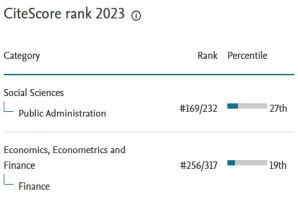A 2014-es államszámviteli reform az önkormányzati tapasztalatok tükrében
Pilotprojekt a problémák feltárására
DOI:
https://doi.org/10.35551/PFQ_2020_2_6Kulcsszavak:
államháztartási számvitel, eredményszemlélet, H830Absztrakt
Az államháztartási számvitel 2014-es megújulása a közszféra egyik legnagyobb reformjának tekinthető. A korábban alkalmazott számviteli információs rendszer jelentős hiányosságokkal rendelkezett, amely végső soron az önkormányzati rendszer működésének zavaraihoz, eladósodottságához vezetett. A kutatás célja: feltárni a hazai települési önkormányzatok tapasztalatait a számviteli reform bevezetésének folyamatával, valamint az újonnan kialakuló rendszerrel kapcsolatban. A vizsgálat során 8 intézmény 18 szakértőjével készültek interjúk és kiscsoportos megkérdezések. Az elmondottak alapján az átállás időszakát egy turbulens periódusként jellemezhetjük, az új szabályozásnak való megfelelés próbára tette az önkormányzatok alkalmazkodóképességét. Az újonnan kialakuló rendszerrel kapcsolatos vélemények heterogénnek tekinthetők. A megkérdezettek szerint az új államszámvitel képes támogatni a megbízható és valós kép kialakulását, naprakész információkat biztosít az adott szervezeti egységről. Ennek ellenére a rendszer nem hozott osztatlan sikert, ugyanis egy sokkal összetettebb és nehezebben kezelhető rendszer jött létre, emellett arra is fény derült, hogy a számviteli információs rendszer adatai a legtöbb esetben nem töltik be a nekik szánt szerepet a gazdálkodás során.
Hivatkozások
Adhikari, P., Gårseth-nesbakk, l. (2016). Implementing public sector accruals in oECD member states: major issues and challenges. Account-ing Forum 40(2), pp. 125–142, https://doi.org/10.1016/j.accfor.2016.02.001
Arnaboldi, m., lapsley, I. (2009). on the Implementation of accrual accounting: a Study of Conflict and ambiguity. European Accounting Review, 18(4), pp. 809–836, https://doi.org/10.1080/09638180903136225
Babbie E. (2001). A társadalomtudományi kutatás módszertana. Balassi kiadó, Budapest
Balog E., Jakab á. (2017). az eredményszemlé-letű számvitel bevezetése a nemzetközi tapasztalatok tükrében. In: Farkas B. & Pelle a. (eds): Várakozá-sok és gazdasági iterációk. JATE Press, Szeged, 81– 94. oldal
Barriball, k. l., While, a. (1994). Collecting data using a semi-structured interview: a discussion paper. Journal of Advanced Nursing-Institutional Subscription, 19(2), pp. 328–335
Barton, a. (2009). The use and abuse of ac-countin in the Public Sector Financial manage-ment Reform Program in australia. Abacus, 45(2), pp 221–248, https://doi.org/10.1111/j.1467-6281.2009.00283.x
Bathó F. (2012). melyik úton, merre tovább? az eredményszemléletű számvitelre történő áttérés elvi programja. Pénzügyi Szemle, 57(4), 426–443. oldal
Becker, S., Jagalla, t., Skærbæk, P. (2013). The translation of accrual accounting and budgeting and there configuration of public sector accountant’s identities. Critical Perspectives on Accounting, 25 (4–5), pp. 324–338, https://doi.org/10.1016/j.cpa.2013.05.004
Brorström, B. (1998). accrual accounting, Politics and Politicians. Financial Accountability & Management, 14(4), pp. 319–333, https://doi.org/10.1111/1468-0408.00068
Brusca, I., martínez, C. m. (2016). adopting International Public Sector accounting Standards: a challange for modernizing and harmonizing public sector accounting. International Review of Administrative Sciences, 82(4), pp. 724–744, https://doi.org/10.1177/0020852315600232
Carnegie, G. D., West, B. P. (2003). How Well Does accrual accounting Fit the Public Sector? Australian Journal of Public Administration, 62(2), pp. 83–86 , https://doi.org/10.1111/1467-8497.00327
Carlin, t. m. (2005). Debating the Impact of accrual accounting and Reporting in the Public Sector. Financial Accountability and Management, 21, pp. 309–336 , https://doi.org/10.1111/j.0267-4424.2005.00223.x
DiCicco-Bloom, B., Crabtree, B. F. (2006). The qualitative research interview. Medical Education, 40, pp. 314–321, https://doi.org/10.1111/j.1365-2929.2006.02418.x
Guthrie, J. (1998). application of accrual ac-counting un the australian public Sector – Rhetoric or Reality? Financial Accountability & Management, 14(1), pp. 1–19, https://doi.org/10.1111/1468-0408.00047
van der Hoek, P. m. (2005). From Cash to accrual Budgeting and accounting in the Public Sector: The Dutch Experience. Public Budgeting & Finanace, 25(1) pp. 32–45, https://doi.org/10.1111/j.0275-1100.2005.00353.x
Hyndman, n., Connolly, C. (2011). accruals accounting in the public sector: a road not always taken. Management Accounting Research, 22(1), pp. 36–45, https://doi.org/10.1016/j.mar.2010.10.008
Kallio, H., Pietila, a., Johnson, m., kangasniemi, m. (2016). Systematic methodological review: developing a framework for a qualitative semi-structured interview guide. Journal of Advanced Nursing, 72(12), pp. 2954–2965, https://doi.org/10.1111/jan.13031
Kovács Zs. I., Deák I. (2012). Számvitel – szak-ma versus tudomány. Pénzügyi Szemle, 57(4), 458–468. oldal
Lapsley, I. (2009). new Public management: The Cruellest Invention of the Human Spirit? Abacus, 45(1), pp. 1–21, https://doi.org/10.1111/j.1467-6281.2009.00275.x
Lapsley, I., mussari, R., Paulsson, G. (2009). on the adoption of accrual accounting in the Public Sector: a Self-Evident and Problematic Reform. Eu-ropean Accounting Review, 18(4), pp. 719–723, https://doi.org/10.1080/09638180903334960
Lentner Cs. (2019). Önkormányzati pénz- és vagyongazdálkodás. Dialóg Campus, Budapest
Miksell, J., l. (2006). Fiscal administration: analysis and applications for the Public Sector. Thompson Wadsworth, Belmont
Neulinger á. (2016). több-módszertanú és ve-gyes módszertanú kutatások. Vezetéstudomány (47), 4, 63–66. oldal
Ouda, H. G. a. (2003). accrual accounting in the Government Sector. Public Fund Digest, 3(2), pp. 52–73
Oulasvirta, l. (2014). The reluctance of a developed country to choose International Public Sector accounting Standards of the IFaC. a critcal case study. Critical Perspective on Accounting, 25, pp. 272–285, https://doi.org/10.1016/j.cpa.2012.12.001
Pályi k. á. (2015). a Számvevőszék hozzájárulá-sa a jó kormányzáshoz és a számvitel megújításához. Pénzügyi Szemle, 60(4), 536–556. oldal
Pina, V., torres, l., yetano, a. (2009). accrual accounting in Eu local Governments: one method, Several approaches. European Accounting Review, 18(4), pp. 765–807, https://doi.org/10.1080/09638180903118694
Paulsson, G. (2006). accrual accounting in the Public Sector: Experiences from the Central Government in Sweden. Financial Accountability & Management, 22 (1), pp. 47–62, https://doi.org/10.1111/j.0267-4424.2006.00392.x
Rabbiee, F. (2004). Focus-group interview and data analysis. Proceedings of the Nutrition Society, 63(4), pp. 655–660, https://doi.org/10.1079/PnS2004399
Robinson, m. (1998). accrual accounting and the Efficiency of the Core Public Sector. Fi-nancial Accountability & Management, 14(1), pp. 21–37, https://doi.org/10.1111/1468-0408.00048
Salleh, k., aziz, a., Bakar, y. (2014). accrual accounting in Government: is Fund account-ing Still Relevant? Procedia–Social and Behavioral Sciences, 164, pp. 172–179, https://doi.org/10.1016/j.sbspro.2014.11.065
Simon J., Fejszák t., Schatz, B., Donchev, t., Ivanov, m. (2018). az eredményszemléletű számvitelre áttérés tapasztalatai számvevőszéki aspektusból. Pénzügyi Szemle, 63(2), 145–160. oldal
Tickell, G. (2010). Cash to accrual account-ing: one nation’s Dilemma. International Busi-ness & Economics Research Journal, 9(11), pp. 71–78, https://doi.org/10.19030/iber.v9i11.32
Turner, D. W. (2010). Qualitative Interview Design: a Practical Guide for novice Investigators. The Qualitative Report , 15(3), pp. 754–760
Európai Bizottság (2013). Report from the Commission to the Council and the European Parliament. towards Implementing Harmonised Public Sector accounting standards in member States. The Suitability of IPSaS for member States, online: http://www.epsas.eu/en/documents/1_En_ aCt_part1_v5.pdf
PwC (2015). towards a new era in government accounting and reporting, 2nd edition. online: https://www.pwc.se/sv/pdf-reports/towards-a-new-era-in-government-accounting-and-reporting-july-2015.pdf
##submission.downloads##
Megjelent
Hogyan kell idézni
Folyóirat szám
Rovat
License
Authors assign copyright to Pénzügyi Szemle / Public Finance Quarterly. Authors are responsible for permission to reproduce copyright material from other sources.











